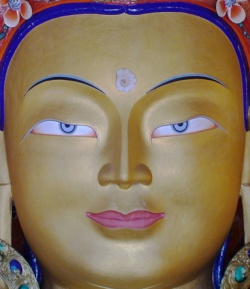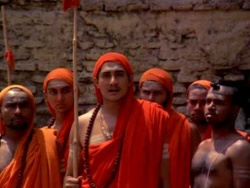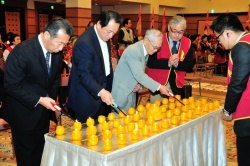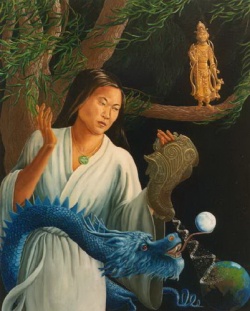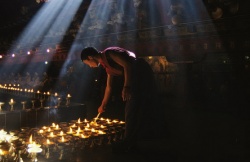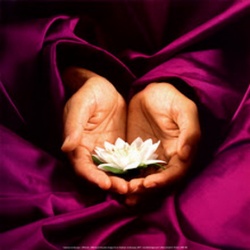Questions and answers about Buddhism?
- Do children practice the faith?
Certainly children can be included in most activities but 'having faith' implies some understanding and I wonder at what age children are capable of understanding? Without some basic understanding of whatever it is you practice then faith is 'blind'. Much of the Buddhist teaching is pointing to direct experience where no faith is needed and sometimes children do have an intuitive sense of their spiritual dimension. A Buddhist's faith is primarily in the enlightenment of the Buddha, and, until it is actually realised, one can only have faith that it is possible and follow the teachings through that faith.
- What is a child's role in Buddhism in Britain?
At the moment, as Buddhism is not a major religion in Britain, children generally only participate in relation to their parent's involvement. This is probably also the case for Christianity. Parents want what is good for their children, so if Buddhism is seen as 'good', then parents will make sure their children have contact with it.
- How are children introduced to Buddhism?
Much of children's religious education is indoctrination - how can they be expected to understand when life is still unexplored? Indoctrination may sound oppressive, but how do we learn anything? We are conditioned from birth, but as long as free questioning is part of the process, then freedom is possible. Children are introduced to Buddhism by being exposed to things Buddhist. Whether they choose to practice it or not is, ideally, up to them.
- Are lay Buddhists generous?
Having lived dependant on alms food for several years it is my experience that they are - I have never had to go hungry. I don't have any money, but, because the needs of a monk are relatively few, I have never had to go without much at all because of the generosity of the people that have faith in this tradition. There is one way of summarising Buddhist practice - generosity, morality and mental development. When considering the second noble truth about craving (desire, greed. etc.) it is not difficult to see that generosity can be an effective antidote for this. If we are able to practice giving away material things then this makes it easier to let go of things like wrong views or perceptions, especially in relation to ourselves. Attaching (holding, grasping, etc.) to any view about yourself will lead to suffering. Practising generosity to balance selfishness is a good thing to do.
- Christian's use the Bible, Islam the Koran, what do Buddhists use?
The Buddhist scriptures are known as 'The Tipitaka'. 'Pitaka' is Pali for basket and 'ti' is the same as 'tri' as in triangle. So we have The Three Baskets. They are called baskets because they contain or hold the teachings. The three are: The Vinaya Pitaka - which lists all the rules for the monks and nuns, and various stories and teachings as to how they were formed. The Sutta Pitaka - is a huge collection of teachings on various subjects; most of these were given by the Buddha. The Abhidhamma Pitaka - a very systematic summary of the Sutta Pitaka along philosophical and psychological lines. This was compiled quite some time after the Buddha died. Because the Buddha taught for forty five years the collection of his teaching is enormous - about thirty large volumes.
- Can anyone become a Buddhist?
Sure, no problem. There are no restrictions on age, gender, nationality, body weight, A-levels or anything. Buddhism is a very tolerant religion. People can find their own level of practice, and there is no kind of excommunication if you do anything naughty. There are certain standards of behaviour expected in a monastery or temple but nobody is refused entry because of anything they may have done.
- How do you become a Buddhist?
Becoming a Buddhist is actually quite simple. You make a commitment to living your life by the principles embodied in the 'Three Refuges' and the 'Five Precepts'. You can study the refuges and precepts and can 'take them' on your own and feel that you are a Buddhist. However it is nice to have a monk or a nun formally 'give them' to you in a ceremony. Making a public statement also helps you to remember when you feel like you want to go 'outside' the precepts - when you want to be heedless or stupid; when you go against nature; when you want to be immoral. To take refuge generally is to take shelter in a place where one feels safe. In this context refuge is an 'environment', a set of lifestyle principles that you can trust, a refuge for the heart and mind. First you need to learn what they are; so that their meaning is clear and you understand what a commitment to following them means.
- What are the basic principles of being a Buddhist?
The perception of 'being a Buddhist' will vary between different cultures, but in the Theravada tradition the common standard is taking the 'Three Refuges' and the 'Five Precepts'. It is important to get some understanding of what these mean before making a commitment.
- The Buddha - is traditionally thought of as a person but 'Buddha' is actually a title. It means 'awakened or enlightened one'. It refers to a quality or way of being that we are all able to realise. Taking refuge in Buddha is saying 'I trust that this enlightenment is possible and that I will make an effort to be 'awake' (not daydreaming or heedless) as I live my life.
- The Dhamma - is the teaching of the Buddha. These teachings are really just expressions of natural laws which the Buddha came to understand - particularly the laws of human nature. When we take refuge in Dhamma, we take refuge in the teachings of the Buddha - which is refuge in the truth and purity of our own true nature.
- The Sangha - which means congregation, is made up of those monks, nuns or lay people who follow the Buddhist way of life. They aspire to practising kindness, developing wisdom, morality and goodness through the guidance of the 'Noble Eightfold Path' which was prescribed by the Buddha as the raft that will take us across the river of life to Nibbana. The eight steps of the path are: right understanding, right aspiration, right action, right speech, right livelihood, right effort, right mindfulness, right concentration.
Part of taking refuge in the Sangha, therefore, includes the exhortation to 'right action' which is based on the Buddhist moral code of behaviour. In its basic form this is 'The Five Precepts':
- Not killing or harming living beings. This is being kind.
- Not taking what is not given (not stealing). This is being honest.
- Not being unfaithful in relationships. This is being trustworthy.
- Not using wrong speech. This is being truthful.
- Not taking intoxicating drink or drugs. This is being clear minded.
- What is the practice of setting birds free from cages about?
I remember having a discussion about some odd things in another religion and my friend said 'Oh, there's nothing wrong with 'xxxx' religion it's just the people who practice it.' Have you ever set yourself up an exercise routine (or a diet?). You make a list of exercises and how long you will spend on each one and on what days; it all looks so clear and logical, and you are so inspired - but then . . . how does it work in reality? And then you read about some wonderful exercise machine - only needs ten minutes a day; and then some special formula muscle toner - no need for exercise at all! Usually we like to find an easy way, the soft option; but there is no substitute for work. Religion is not so different in this way. The idea behind the birds in cages is that you buy the bird (off someone who has captured it with you in mind) and set it free. Liberating a trapped animal is a wonderful thing to do - good Kamma, much merit. Hey, get serious. Buddhism is about purifying one's heart. Purification always involves personal sacrifice, going against our desires, doing things which are often difficult - this is not so easy.
- What do lay Buddhists do as part of their daily religion?
Many Westerners are attracted to Buddhism because of meditation - rather than devotion or faith - so practices will vary a lot depending on individuals. Families will usually have a small shrine in their house and connect with it in some way at different times of the day - perhaps lighting candles and incense; offering flowers; bowing. I know those parents that meditate usually sit in front of the shrine and will invite their children to join them for a bit. Many people enjoy doing the traditional chants - both in Pali and English. If there is a monastery not too far away they may take offerings there for the ordained community - weekends are very popular for this as people aren't at work and have the time to travel a bit further. There are weekly observance days, festival days and memorial days when people are always welcome to come to the monastery. In Asian Buddhist countries there would be a monastery not far from most people and it would be the focus of much attention from the local community.
- Can lay people get enlightened or do you have to be a monk?
There are several references in the scriptures to lay people getting enlightened during the time of the Buddha and, having been both a lay person and a monk, I can't think of any reason why it shouldn't be possible. The big difference is the time and energy available to work on it. As a monk my life isn't as complicated as it was as a layman so I have more opportunity to figure out why I'm not free from suffering; why I say things I don't really mean; why I can't be more (or even always) kind and compassionate. As a householder so much time gets taken up just running one's life - study, rent, bills, money, bus timetables, relationships, etc. But it is important to use what time you have wisely and, in relation to the law of Kamma, you have to do the work eventually anyway - this lifetime or the next - or the next - or the next. May as well start now.
- Do Buddhists believe in marriage and what do they do?
The idea behind marriage is that two people make a 'contract'. The Christian form goes something like: 'to love and cherish, to honour and obey, . . . in sickness and in health, 'til death do us part.' As there is no 'God' in Buddhism, monks or nuns aren't set up as divine intermediaries with any kind of special power to negotiate such a contract so, strictly speaking, there is no Buddhist marriage. In Buddhist countries there are legal forms for marriage but the religious side is an affirmation of the couple's commitment to live in accordance with the refuges and precepts. The couple and their families would go to the monastery (not necessarily on the day of their wedding) and make offerings to the Sangha and formally request the refuges and precepts. The Sangha would chant blessings (in Pali), not saying 'we think it's good you are getting together', but giving hearty support for their connection to Buddhism. What this connection expects of them in terms of behaviour is: The first precept encourages kindness and caring; the second: generosity; the third focuses on responsibility in relationships and encourages commitment and trustworthiness (specifically sexually); the fourth promotes gentle, useful and wise speech and the fifth, sobriety. The refuges are a commitment to wisdom (Buddha); truth (Dhamma) and morality (Sangha). If couples could do that much they would indeed live happily ever after.
- What form do Buddhist funerals take?
Death is seen as an important time in Buddhism. It is a time of grief for those close to the deceased and a time for love and caring, for kindness and compassion for all - these are basic human values. From a spiritual perspective it is a time to contemplate your own mortality, your attachment to material things (especially your body) and to consider where true happiness and freedom are to be found. Being in the presence of a corpse encourages such deep thought, so the deceased is usually kept in the home so people can come and visit to pay their last respects and ask for forgiveness.
Monks would be invited to the home - ideally every day for seven days - and they would offer reflections on the naturalness of death and the importance of making effort to live according to spiritual values. There are several traditional funeral chants which examine the conditioned nature of the human body. Water is often poured over the body - a little by each person - before the coffin is closed for the last time. Families will often make offerings at the monastery to mark the anniversary of the death. This would be after one month, three months and then annually.
- What are the Buddhist views on sex and relationships?
This is pretty much covered by the third precept - on fidelity. The emphasis is on consideration of others and it acknowledges the pain the second party in a relationship feels when their partner has a sexual affair. There is nothing in the teachings about same-sex relationships, but the principle is the same. Ideally we are all free from attachment and it doesn't matter, but the reality is that strong bonds do form in relationships. These are very much based on trust and when that trust is broken it is almost always a source of suffering; this is especially so when children are involved.
- Do Buddhists pray to the Buddha?
Praying is asking someone for something. I pray (to God) for rain. There is an assumption that the 'one' prayed to is omnipotent and has the full power to grant your wish. In Buddhism there are various gods and beings of greater and lesser powers that can be appealed to but, although they supposedly live an incredibly long time, they are still mortal just like you and I and are certainly not omnipotent.
The Buddha, the historical figure, died well over 2000 years ago and because he was enlightened, nothing more remains. Buddha as a title - that which is enlightened, awake, truly wise - exists in some way as a possibility for all to realise but not as a separate, decision-making entity as in: 'OK. Venerable Kusalo has been a good monk, I'll answer his prayer for more sultanas in the muesli'.
Certainly Kamma is stored or registered somewhere and the forces or energies of greed, hatred and delusion are about in various guises. Inviting or praying to the forces of goodness is a part of Buddhism - not in the sense that they will sort it out for me but that they will be allies or a support in my efforts.
- What are the main Buddhist festivals and celebrations?
There are several small ones which may vary between cultures and others which might be exclusive to one culture. However there are two main events which are celebrated universally; Vesak and Kathina.
Vesak falls on the full moon of May and celebrates the birth, enlightenment and final passing of the Buddha, so it is a time when the life of the Buddha is reflected on. The local temple would be decorated with flowers and lights. Often the lights are paper lanterns made by various families and brought to the monastery to be lit in the evening. Lay people would come to the monastery for the day - often wearing white clothes - and take the eight precepts. They would help with the meal offering in the morning and in the afternoon there would be group meditation. In the evening there would be a gathering in the temple with auspicious chanting by the Sangha and a talk, reflecting on the life of the Buddha, given by the senior monk. The lamps would be lit and everyone would circumambulate either the temple or more often a separate shrine or stupa. They would go round three times - reflecting on the three refuges - in a sun-wise (clockwise) direction (with the right shoulder to the stupa) carrying flowers and incense which would be placed at the base of the stupa at the end of the third round. A mantra or gatha might be chanted during the circumambulation.
Kathina covers a period of a month, and one day would be chosen to celebrate it within that time. It marks the end of the three-month Asian monsoon season during which the monks and nuns would have stayed in one monastery. At the end of the monsoon the Sangha would often prepare to go wandering. In Britain, because the seasons are reversed, we are preparing for winter. In either case the celebration focuses around the offering of cloth for making robes. It is also a time for the lay people to make general offerings to the monastery to ensure it is well provided for in the coming season. The Kathina cloth is offered in a very formal ceremony and the monks then take the cloth and use part of it to sew one robe. It has to be finished before the following dawn and every monk must take some part in the making of this robe. When it is finished it is given to one of the senior monks. It is an honour to be chosen to receive this robe.
- Do Buddhists celebrate Christmas?
In the West most of the monastery residents have come from a basically Christian culture, so Christmas has some meaning for us. We don't have Christian rituals, but the spirit of Christmas - giving gifts, kindness, love, peace to all mankind - is something we enjoy and is a reason to celebrate. We send and receive a lot of cards. This year we decorated the temple with holly and evergreens, lit a lot of candles, did some special chanting in the temple, listened to a tape of some Christian monastic chanting and held a late night meditation vigil. When you look at different religions it is not difficult to find similarities so at this time we focus on those.
